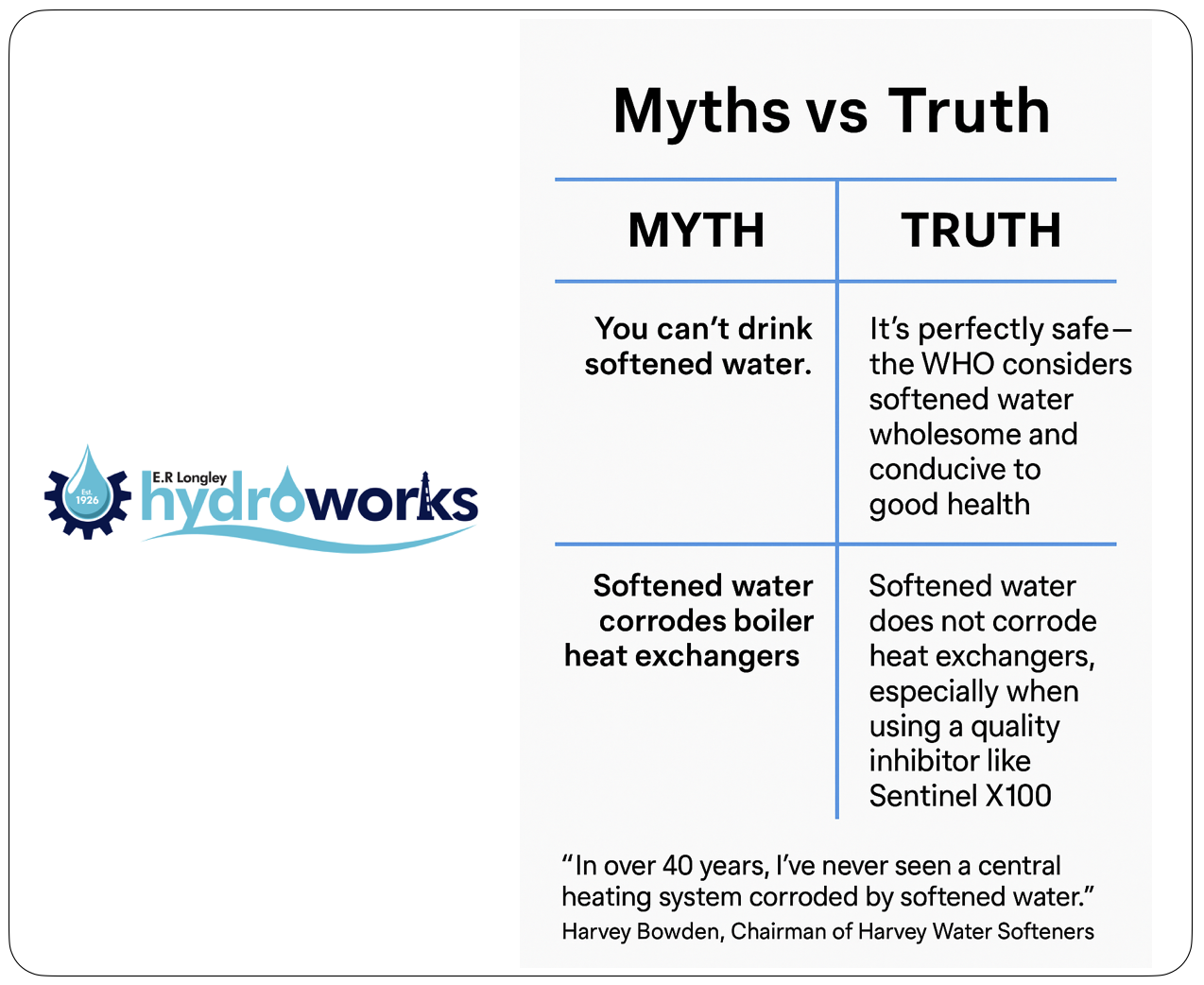Can you put softened water into a boiler?
Short Answer: Yes, you absolutely can!
In my 26+ years in this industry, two myths have caused more confusion than any others:
“You can’t drink softened water.”
Totally untrue. It’s perfectly safe, and even the World Health Organisation (WHO) confirms it’s wholesome and conducive to good health. I’ve written a full page about this here:
Can you safely drink softened water?
“Softened water corrodes boiler heat exchangers.”
Also false. This idea mainly stems from a few boiler manufacturers, like Worcester Bosch and Ideal, who have voiced caution - but only in the UK. Their advice can even change depending on which country you’re in! So, if you have one of their boilers, we tell you here how not to fall foul of their advice. Most other manufacturers, however, are very pro softened water.

So what are the real facts about boilers?
Softened water does not corrode aluminium heat exchangers - and extra peace-of-mind can be obtained when paired with a quality corrosion inhibitor like Sentinel X100 which your heating engineer can arrange for you.
In fact, if you’re using a British-made Harvey Minimax softener, the manufacturer guarantees your boiler won’t suffer corrosion when used with Sentinel X100.
As of 2016, Worcester Bosch - after 18 years - has still never shown the industry a heat exchanger corroded by softened water.
Most of the confusion stems from mixed messages between boiler manufacturers, inhibitor brands, certifying bodies, and the water treatment industry. Meanwhile, in countries like Germany, softened water is recommended, and corrosion inhibitors are not. Strange, huh!
Important distinction: Naturally soft vs artificially softened
-
Naturally soft water (like in parts of Scotland, Wales or Cornwall) can be corrosive due to low mineral content and low pH.
-
Artificially softened water (produced by a water softener) is not corrosive, and no evidence has shown it to cause harm to boiler systems.
What do the experts say?
Harvey Bowden, Chairman of Harvey Water Softeners, put it plainly:
- “In over 40 years, I’ve never seen a central heating system corroded by softened water. Worcester Bosch hasn’t shown one either. Use Sentinel X100, and you’re protected.”
and went further:
- "I have never seen any evidence of a central heating system corroded because of softened water and I’ve been here for over 40 years. I have never heard from anyone who has experienced corrosion from softened water. Worcester Bosch, after 18 years, has never been able to show me a heat exchanger corroded by softened water.
I have heard from many of you that say they never use corrosion inhibitors and they still don’t get any corrosion of aluminium or any other metal.
All central heating systems should be protected by using an inhibitor designed for the purpose. The current British Standard 7595:2006 categorically states that you can use softened water with the correct inhibitor type. There is an inhibitor on the market specifically designed to work with softened water, Sentinel X100. -So the common-sense position is this:
Use softened water in your central heating system and enjoy its benefits. Use Sentinel X100 as your corrosion inhibitor.
If you are installing one of my softeners, such as one from the Minimax range sold by Hydroworks, you can download a letter from me guaranteeing your aluminium heat exchanger."
So, what’s the Hydroworks best advice?
If you’re not installing a Minimax softener, that’s OK - just make a decision that feels right for you. Read between the lines, check the sources, and weigh up the facts.





